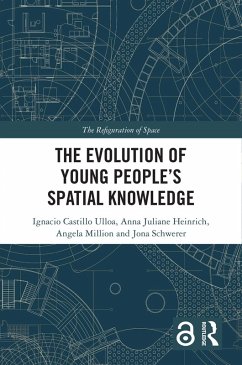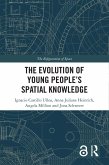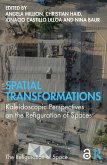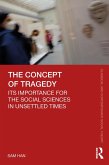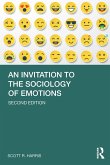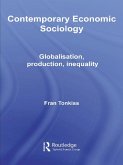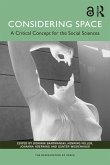Ignacio Castillo Ulloa, Anna Juliane Heinrich, Angela Million, Jona Schwerer
The Evolution of Young People's Spatial Knowledge (eBook, ePUB)
0,00 €
0,00 €
inkl. MwSt.
Sofort per Download lieferbar

0 °P sammeln
0,00 €
Als Download kaufen

0,00 €
inkl. MwSt.
Sofort per Download lieferbar

0 °P sammeln
Jetzt verschenken
Alle Infos zum eBook verschenken
0,00 €
inkl. MwSt.
Sofort per Download lieferbar
Alle Infos zum eBook verschenken

0 °P sammeln
Ignacio Castillo Ulloa, Anna Juliane Heinrich, Angela Million, Jona Schwerer
The Evolution of Young People's Spatial Knowledge (eBook, ePUB)
- Format: ePub
- Merkliste
- Auf die Merkliste
- Bewerten Bewerten
- Teilen
- Produkt teilen
- Produkterinnerung
- Produkterinnerung

Bitte loggen Sie sich zunächst in Ihr Kundenkonto ein oder registrieren Sie sich bei
bücher.de, um das eBook-Abo tolino select nutzen zu können.
Hier können Sie sich einloggen
Hier können Sie sich einloggen
Sie sind bereits eingeloggt. Klicken Sie auf 2. tolino select Abo, um fortzufahren.

Bitte loggen Sie sich zunächst in Ihr Kundenkonto ein oder registrieren Sie sich bei bücher.de, um das eBook-Abo tolino select nutzen zu können.
Based on a qualitative meta-analysis, synthesis and interpretation of seventy published studies spanning several decades, this book examines the evolution of spatial knowledge among young people, considering both conceptual tensions and the practical implications of its findings for urban planning and design.
- Geräte: eReader
- ohne Kopierschutz
- eBook Hilfe
- Größe: 7.3MB
Andere Kunden interessierten sich auch für
![The Evolution of Young People's Spatial Knowledge (eBook, PDF) The Evolution of Young People's Spatial Knowledge (eBook, PDF)]() Ignacio Castillo UlloaThe Evolution of Young People's Spatial Knowledge (eBook, PDF)0,00 €
Ignacio Castillo UlloaThe Evolution of Young People's Spatial Knowledge (eBook, PDF)0,00 €![Spatial Transformations (eBook, ePUB) Spatial Transformations (eBook, ePUB)]() Spatial Transformations (eBook, ePUB)0,00 €
Spatial Transformations (eBook, ePUB)0,00 €![The Concept of Tragedy (eBook, ePUB) The Concept of Tragedy (eBook, ePUB)]() Sam HanThe Concept of Tragedy (eBook, ePUB)41,95 €
Sam HanThe Concept of Tragedy (eBook, ePUB)41,95 €![An Invitation to the Sociology of Emotions (eBook, ePUB) An Invitation to the Sociology of Emotions (eBook, ePUB)]() Scott HarrisAn Invitation to the Sociology of Emotions (eBook, ePUB)39,95 €
Scott HarrisAn Invitation to the Sociology of Emotions (eBook, ePUB)39,95 €![Contemporary Economic Sociology (eBook, ePUB) Contemporary Economic Sociology (eBook, ePUB)]() Fran TonkissContemporary Economic Sociology (eBook, ePUB)53,95 €
Fran TonkissContemporary Economic Sociology (eBook, ePUB)53,95 €![A Genealogy of Social Violence (eBook, ePUB) A Genealogy of Social Violence (eBook, ePUB)]() Clint JonesA Genealogy of Social Violence (eBook, ePUB)53,95 €
Clint JonesA Genealogy of Social Violence (eBook, ePUB)53,95 €![Considering Space (eBook, ePUB) Considering Space (eBook, ePUB)]() Considering Space (eBook, ePUB)0,00 €
Considering Space (eBook, ePUB)0,00 €-
-
-
Based on a qualitative meta-analysis, synthesis and interpretation of seventy published studies spanning several decades, this book examines the evolution of spatial knowledge among young people, considering both conceptual tensions and the practical implications of its findings for urban planning and design.
Dieser Download kann aus rechtlichen Gründen nur mit Rechnungsadresse in A, B, BG, CY, CZ, D, DK, EW, E, FIN, F, GR, HR, H, IRL, I, LT, L, LR, M, NL, PL, P, R, S, SLO, SK ausgeliefert werden.
Produktdetails
- Produktdetails
- Verlag: Taylor & Francis eBooks
- Seitenzahl: 280
- Erscheinungstermin: 7. September 2023
- Englisch
- ISBN-13: 9781000933017
- Artikelnr.: 68784088
- Verlag: Taylor & Francis eBooks
- Seitenzahl: 280
- Erscheinungstermin: 7. September 2023
- Englisch
- ISBN-13: 9781000933017
- Artikelnr.: 68784088
- Herstellerkennzeichnung Die Herstellerinformationen sind derzeit nicht verfügbar.
Ignacio Castillo Ulloa, PhD, is Researcher and Lecturer in the Institute of Urban and Regional Planning at Technische Universität Berlin, Germany, and co-editor of Spatial Transformations: Kaleidoscopic Perspectives on the Re-Figuration of Spaces. He is Researcher at the CRC 1265 "Re-Figuration of Spaces."
Anna Juliane Heinrich, PhD, is Researcher and Lecturer in the Institute of Urban and Regional Planning at Technische Universität Berlin, Germany, and the co-editor of Education, Space and Urban Planning: Education as a Component of the City. She is PI at the CRC 1265 "Re-Figuration of Spaces."
Angela Million, PhD, is Professor of Urban Design and Urban Development at Technische Universität Berlin, Germany. She is the co-editor of Spatial Transformations: Kaleidoscopic Perspectives on the Refiguration of Spaces and Education, Space and Urban Planning: Education as a Component of the City. She is PI at the CRC 1265 "Re-Figuration of Spaces."
Jona Schwerer is Research Assistant in the Research Center "Transformations of Political Violence" at the Chair of Urban Sociology and Sociology of Space at the Technical University of Darmstadt. He is an associate member of the CRC 1265 "Re-Figuration of Spaces."
Anna Juliane Heinrich, PhD, is Researcher and Lecturer in the Institute of Urban and Regional Planning at Technische Universität Berlin, Germany, and the co-editor of Education, Space and Urban Planning: Education as a Component of the City. She is PI at the CRC 1265 "Re-Figuration of Spaces."
Angela Million, PhD, is Professor of Urban Design and Urban Development at Technische Universität Berlin, Germany. She is the co-editor of Spatial Transformations: Kaleidoscopic Perspectives on the Refiguration of Spaces and Education, Space and Urban Planning: Education as a Component of the City. She is PI at the CRC 1265 "Re-Figuration of Spaces."
Jona Schwerer is Research Assistant in the Research Center "Transformations of Political Violence" at the Chair of Urban Sociology and Sociology of Space at the Technical University of Darmstadt. He is an associate member of the CRC 1265 "Re-Figuration of Spaces."
1 Finding Change: Identifying and Explaining How Young People's Spatial Knowledge is Refigured 2 Investigating the Refiguration of Spaces by Means of Young People's Spatial Knowledge: A Conceptual Introduction 3 Second-Level Empiricism, or Learning to Read Between Interpretative Orders: A Snapshot of Our Qualitative Meta-Analysis 4 Young People's Spatialities: From Physical-Material Rigidity to Virtual Versatility 5 Spatial Perception: Assessments of Today and What a Spatial Future Might Look Like 6 Learning Arenas and Agencies of Spatial Knowledge: Physical-Sensory Production, Scholastic Acquisition, and a Varied In-Between 7 The Domestication of Young People's Spatial Knowledge: Social Control and Spatial Pedagogization 8 The Evolution of Young People's Spatial Knowledge: Overarching Findings, Connections, and Takeaways
1 Finding Change: Identifying and Explaining How Young People's Spatial
Knowledge is Refigured 2 Investigating the Refiguration of Spaces by Means
of Young People's Spatial Knowledge: A Conceptual Introduction 3
Second-Level Empiricism, or Learning to Read Between Interpretative Orders:
A Snapshot of Our Qualitative Meta-Analysis 4 Young People's
Spatialities: From Physical-Material Rigidity to Virtual Versatility 5
Spatial Perception: Assessments of Today and What a Spatial Future Might
Look Like 6 Learning Arenas and Agencies of Spatial Knowledge:
Physical-Sensory Production, Scholastic Acquisition, and a Varied
In-Between 7 The Domestication of Young People's Spatial Knowledge: Social
Control and Spatial Pedagogization 8 The Evolution of Young People's
Spatial Knowledge: Overarching Findings, Connections, and Takeaways
Knowledge is Refigured 2 Investigating the Refiguration of Spaces by Means
of Young People's Spatial Knowledge: A Conceptual Introduction 3
Second-Level Empiricism, or Learning to Read Between Interpretative Orders:
A Snapshot of Our Qualitative Meta-Analysis 4 Young People's
Spatialities: From Physical-Material Rigidity to Virtual Versatility 5
Spatial Perception: Assessments of Today and What a Spatial Future Might
Look Like 6 Learning Arenas and Agencies of Spatial Knowledge:
Physical-Sensory Production, Scholastic Acquisition, and a Varied
In-Between 7 The Domestication of Young People's Spatial Knowledge: Social
Control and Spatial Pedagogization 8 The Evolution of Young People's
Spatial Knowledge: Overarching Findings, Connections, and Takeaways
1 Finding Change: Identifying and Explaining How Young People's Spatial Knowledge is Refigured 2 Investigating the Refiguration of Spaces by Means of Young People's Spatial Knowledge: A Conceptual Introduction 3 Second-Level Empiricism, or Learning to Read Between Interpretative Orders: A Snapshot of Our Qualitative Meta-Analysis 4 Young People's Spatialities: From Physical-Material Rigidity to Virtual Versatility 5 Spatial Perception: Assessments of Today and What a Spatial Future Might Look Like 6 Learning Arenas and Agencies of Spatial Knowledge: Physical-Sensory Production, Scholastic Acquisition, and a Varied In-Between 7 The Domestication of Young People's Spatial Knowledge: Social Control and Spatial Pedagogization 8 The Evolution of Young People's Spatial Knowledge: Overarching Findings, Connections, and Takeaways
1 Finding Change: Identifying and Explaining How Young People's Spatial
Knowledge is Refigured 2 Investigating the Refiguration of Spaces by Means
of Young People's Spatial Knowledge: A Conceptual Introduction 3
Second-Level Empiricism, or Learning to Read Between Interpretative Orders:
A Snapshot of Our Qualitative Meta-Analysis 4 Young People's
Spatialities: From Physical-Material Rigidity to Virtual Versatility 5
Spatial Perception: Assessments of Today and What a Spatial Future Might
Look Like 6 Learning Arenas and Agencies of Spatial Knowledge:
Physical-Sensory Production, Scholastic Acquisition, and a Varied
In-Between 7 The Domestication of Young People's Spatial Knowledge: Social
Control and Spatial Pedagogization 8 The Evolution of Young People's
Spatial Knowledge: Overarching Findings, Connections, and Takeaways
Knowledge is Refigured 2 Investigating the Refiguration of Spaces by Means
of Young People's Spatial Knowledge: A Conceptual Introduction 3
Second-Level Empiricism, or Learning to Read Between Interpretative Orders:
A Snapshot of Our Qualitative Meta-Analysis 4 Young People's
Spatialities: From Physical-Material Rigidity to Virtual Versatility 5
Spatial Perception: Assessments of Today and What a Spatial Future Might
Look Like 6 Learning Arenas and Agencies of Spatial Knowledge:
Physical-Sensory Production, Scholastic Acquisition, and a Varied
In-Between 7 The Domestication of Young People's Spatial Knowledge: Social
Control and Spatial Pedagogization 8 The Evolution of Young People's
Spatial Knowledge: Overarching Findings, Connections, and Takeaways
